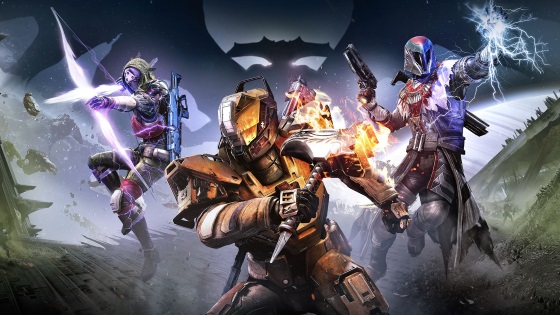Video games and the dark art of seducing players
First comes love, then comes pre-order
I read a piece recently where novelist David Foster Wallace discusses how books and films seduce us. Books especially, with their unique brand of telepathy, have an easy point of ingress into our brains and hearts (and pants, to extend the seduction metaphor). It’s easy to snatch a book off the shelf at the library or bookstore and get drawn into a writer’s premise, into the world of their thoughts. It’s also quite common, especially in this age of entertainment-on-demand, to be flipping through channels or browsing the Netflix catalogue and get drawn into a film or TV show based on a few moments of seductive acting or just a really great episode description.
So how do games seduce us? How do they draw us in and sell us on their worlds? And once they have seduced us, what kind of lovers are games?
The most immediate analog to the casual browsing of films and novels is the downloadable game demo. But demos are only a small, and increasingly disregarded, part of the modern tango of electronic seduction. Demos have fallen out of favor in a big way in the past few years, supplanted by alphas, betas, and early access, and by the howling, vociferous, ravenous machine that is video game marketing.

And that’s where the real seduction begins. These days, games rarely entice you in person. They have teams, whole companies, of exceedingly bright people to virtually wine/dine you, maybe loosen a few buttons so you’re primed and ready when the game itself actually makes an appearance.
Marketing has become an increasingly elaborate (and increasingly expensive) process. All sorts of media, technology, and outlets are brought to bear, all paid lavishly to send ‘hot preview content’ screaming into the eyes, ears, and brains of potential players. Gone are the days in our industry’s infancy where video game ads would never play in primetime. Now games are a multi-billion dollar juggernaut and not only all over primetime TV, but in front of YouTube videos, at sports events, in comics, and even movie theatres.

This inundation combines with the fevered trend to push out unfinished software (the aforementioned early access, alpha, and beta paradigm), further enabled by the prominence of pre-orders, means the vast majority of seduction (and even sales) happen way before there’s an actual game available to buy. It means that, more and more, we’re buying ideas rather than games. This is why people will log onto internet threads and vociferously defend ‘Game X’ months before they’ve even played it, sure in the knowledge they already love it.
Inevitably, the experience of playing the game itself (the finished, final game, in the case of early access products) is post-coital. All the seduction has happened, and really the consummation isn’t the first play experience, it’s the moment of culmination when a game is expelled from the metaphorical body of its publisher and seeded onto store shelves.
Weekly digests, tales from the communities you love, and more
So what’s the net result, what does this mean about the way we play and experience games? For starters, it means that our first hands-on experience with a game often feels vaguely disappointing - just look at the backlash around Destiny. It’s becoming incredibly rare to discover a new game in an organic way and feel that rush of wonder and novelty as you peel back its layers and reveal its core. This year’s Hitman is a rare example of a big-name franchise that is steadily luring players through excitable word of mouth, rather than aggressive PR.

The thing about marketing is that it’s designed to highlight the best features of a product, and for games this means that we often have some of the best narrative moments and interesting mechanics telegraphed for us well in advance. It’s not uncommon for these revelations to border on the territory of naked spoilers, to the point that sometimes games have been so exposed through commercials, livestreams, trailers, and E3 demos that you can sensibly guess 90% of the plot before picking up a controller.
The most glaring example of this in my mind is what happened to Saints Row the Third, a wonderful game with a ton of spectacular moments, weapons, and vehicles, almost all of which were blunted by pre-release exposure. It represents the worst case of a marketing team unable to resist the urge to showcase all of the best stuff in their game, and so when we finally encounter Mayor Burt Reynolds or get our hands on the Apoco-Fist or Gat Mobile we’ve already been mugged of any potential novelty or wonder.

It’s a difficult quandary, and it affects games of varying sizes and ambition differently. On the one hand, indie games that can’t be or aren’t marketed well often fall through the cracks, relying on critics or word of mouth on platforms like Steam for discovery. Not marketing your game appropriately means you risk it disappearing in a crowded marketplace (see: Hitman), but on the other hand, giving players access to a buggy, unfinished build can also be off-putting (see: Street Fighter 5). And there’s the issue of early access games that are, paradoxically, too feature complete, so that by the time the final game ships players are already fatigued by it and are ready for a new flirtation.
On the other hand, it’s easy to come on too strong. The choking cologne and over-solicitous grin of big-budget video game marketing often has the opposite of the intended effect, driving gamers away by showing too much too fast. What the sleaziest examples of this type don’t consider is that in a sense, the marketing becomes a part of the game itself. If we encounter something in marketing over and over and over again, even if in the context of the game it’s a powerful moment, when we do finally discover it it’s already cliche and bland (see: Watchdogs).
As in love, seduction is best when it’s subtle and patient. The sidelong glance, the teaser trailer, the slow trickle of information that culminates in… release. To paraphrase that wonderful nugget of folk wisdom, why buy the game when the beta is free2play? To truly win our hearts, balance must be struck. Of course, we want to be tantalized, we want to be excited for games that haven’t been released, and maybe Freud was right and the satisfaction of our desires will never match our imaginations.
Alan Bradley was once a Hardware Writer for GamesRadar and PC Gamer, specialising in PC hardware. But, Alan is now a freelance journalist. He has bylines at Rolling Stone, Gamasutra, Variety, and more.



